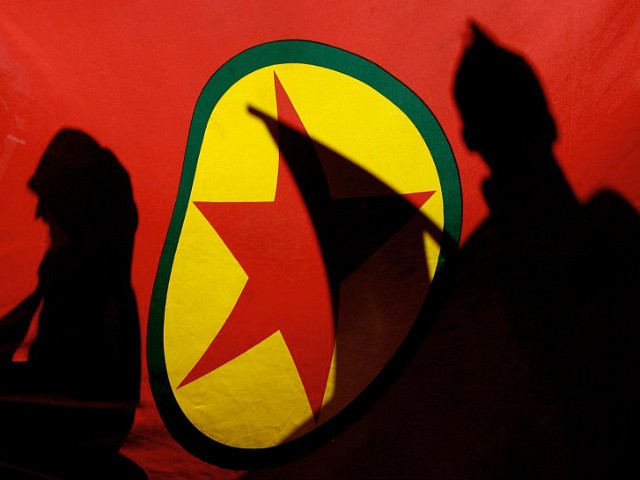Many members of the Yazidi minority group in northern Iraq who had been recruited by the U.S.-designated terror group Kurdistan Workers Party (PKK) to defend their territory against the Islamic State (ISIS/ISIL) are now joining an Iran-allied Shiite paramilitary group trying to capture more territory in the war-ravaged Middle Eastern country.
Between 300 and 800 Yazidis have joined the Baghdad-sanctioned Shiite force known as the Popular Mobilization Units (PMU), Popular Mobilization Forces (PMF) and Hashd al-Shaabi, Rudaw has learned, noting that the vast majority are former members of the anti-ISIS YBS unit formed by the PKK.
“So far, 800 Yezidis have joined the Hashd al Shaabi forces. Young Yezidis try daily to join the Hashd forces. However, the YBS and Peshmerga [forces from northern Iraqi’s autonomous Kurdish region] are preventing them from doing so,” Khudida Juku, a former member of the PKK-linked Shingal Reconstruction Council who now serves with the PMU, told Rudaw.
However, Qasim Simo, director of security forces in the Yazidi-majority region of Sinjar, also spelled Shingal, told Rudaw that “320 Yezidis have this far joined the Hashd forces.”
Simo said an additional 120 more people may have joined the Iran-backed Shiite fighters, adding, “Nearly 150 people who had earlier joined the Hashd al Shaabi forces have regretted their decision and left these forces.”
The PMU is predominantly Shiite but it also includes members of Iraq’s Sunni tribes and minority groups, including Kurds and Christians.
“Many Yezidis joined the Hashd forces after the Shiite paramilitary group started an operation to liberate the ISIS-held areas of south Shingal,” reports the Rudaw.
“I have joined the Hashd al Shaabi forces on principle. They are liberating our areas and then handing them over to us to run them without imposing any conditions on us [Yazidis],” the PMU’s Juku told the Kurdish news outlet.
This month, Naif Jasim, also a Yazidi PMU officer, told Rudaw that the Yazidis want to belong to Iraq, rather than the Kurdistan Regional Government (KRG) in the autonomous northern Iraq region or any other group in the country.
“These areas [Sinjar] are the Yazidis’, but the territory is Iraqi. And we want to belong to Iraq,” Jasim told Rudaw this month.
“We won’t allow the PKK, its affiliated groups or the [KRG] Peshmerga forces to enter these areas. No political party is entitled to enter these places,” added Jasim. “For us, there is no difference between the Peshmerga and PKK forces. These places [belong to the Yazidis]. They are the people who will be running them.”
The PKK’s Shingal Reconstruction Council, formed in December 2014, still maintains a presence in the Yazidi-majority region in Iraq, but many Yazidi recruits affiliated with the Kurdish group have defected to the PMU.
Some KRG and Yazidi leaders have rejected the presence of both the Turkey-based PKK and the Iran-backed Shiite fighters.
While Shiite-controlled Baghdad has sanctioned the PMU, there are conflicting reports about Iraq’s relationship with the PKK terrorists.
The mayor of Sinjar has accused the Iraqi government of backing the PKK, but Turkey claims Baghdad has agreed to join Ankara’s fight against the PKK.
Both the PKK and the Baghdad government have come out against the KRG’s recent call for independence.
PKK fighters allege that their presence in Sinjar is intended to return the Yazidi-majority territory to the control of the minority group.
Now, the PMU also claims it wants to place the Yazidis back in control of Sinjar, recruiting some members of the minority community into its ranks.
In an apparent move to seize more territory in Iraq, the Iran-allied PMU has managed to push the PKK from areas south of the Sinjar region.
Some reports say the PMU is trying to establish a supply route between Iraq and Syria that would benefit the Tehran-backed Shiite troops fighting on behalf of Syrian dictator Bashar al-Assad.
ISIS jihadists decimated Sinjar when they captured large swaths of Iraq and Syria in 2014, killing many of the men and enslaving the women and children. The United States has determined that the Yazidis and other ethnoreligious minority groups have been victims of genocide at the hands of ISIS.
The PKK trained a Yazidi force to combat ISIS while the minority group pleaded the U.S. for help to combat the jihadist group.
